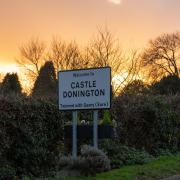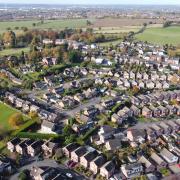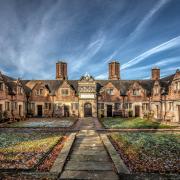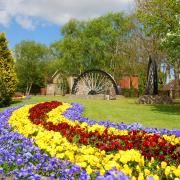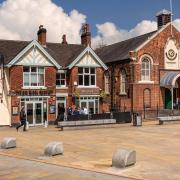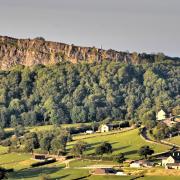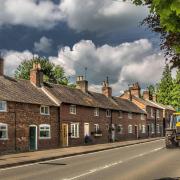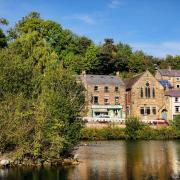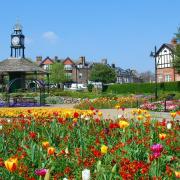Andrew Griffiths visits Bakewell livestock auction to talk to farmers about an industry undergoing change

Barry Wager farms dairy and beef cattle and sheep at Hartington. The Tissington Trail passes his land. Sometimes, he tells me, after a hard day's work, he'll stand and take a break and watch the visitors strolling along the trail, and it will give him a moment's pause.
'You think - why am I here, busting a gut, when all these people are out enjoying themselves - and I get no time?' he says.
It was a Sunday, and his working day on the farm had started at six in the morning and would not end that day until ten at night. He struggles to remember a quote, wanting to get it right. '"I am doing three people's work, with two men's hours, and getting one man's wage." It doesn't really stack up too well, does it?'
I met Barry at the Agricultural Business Centre at Bakewell. It was livestock market day and he was there to sell some cattle. Farming can be a lonely job and market day is, he admits, as much about the social side as it is about trade. 'When I am lambing at home, I probably don't see anyone for eight weeks. You mug the postman, so you can have a word with him, because you've spoken to no one except your kids and your wife. So the social side is very important, there's no two ways about it. It's nice to see people.'

I was at the livestock auction at the invitation of Andrew Critchlow, National Farmers Union (NFU) County Advisor. I was trying to get a feel for the mood amongst the upland farming community at this time of uncertainty when UK farming faces its greatest upheaval since the Agricultural Act of 1947, which sought to increase food production for the nation after the Second World War.
Bakewell was built on the business of its market since the 13th century. The livestock market used to be in the town's streets, but moved to the purpose-built Agricultural Business Centre in 1998. It is next to the showground and coach parks, the ideal stop-off for coaches coming up from London on the northern scenic tour, and hosts the second largest farmers' market in the country.
Bakewell livestock auction is a survivor. Bagshaws, the auctioneering company of 130 years' standing, says that in a typical year around 200,000 sheep and nearly 40,000 cattle and calves pass through. The market has survived due to consolidation - smaller livestock markets in surrounding towns and villages have gone out of business so Bakewell has been the strategic winner.
'The buyers will come from a way away because in the eastern part of the country they haven't got many livestock markets,' says Andrew Critchlow. 'Cattle and sheep are mainly in the west of the country, because the eastern part is predominantly arable. So obviously, if they have the arable land, they have the food to feed the livestock. So you have migration from west to east.'
Few will mourn the passing of the Common Agricultural Policy (CAP) - assuming Brexit goes ahead. It is, according to conservation group Greener UK 'widely regarded as inefficient and ineffective by farmers and land managers, conservationists and economists alike.'
Since the Brexit vote there has been a lot of talk and proposed legislation addressing the environment: the Government's 25-year Environment Plan, a new Environment Act, and the Agriculture Bill currently going through, which seeks to ensure 'stability' for farmers as we leave the EU.
The proposed system for rewarding farmers that will replace the CAP, one of 'public goods' - where farmers are paid for the services they provide to society, such as clean water, public access and carbon sequestration - has been welcomed by most, especially environmentalists.
But one 'public good' that has been missing from this whole debate, as the farmers see it, is food. And that is, as they still see themselves, their primary purpose. Since the Agricultural Act of 1947 they have supplied us with affordable and plentiful food for half a century or more, but now, they say, it is as if, as a nation, we have forgotten about our food altogether.
Concern for the environment has never been greater in the public consciousness. It reached a high pitch with the 2018 IPCC report which was seized on by the media as it gave a ticking clock of 2030 to reduce warming to 1.5°C or face dire ecological consequences.
This high pitch reached a tipping point with Extinction Rebellion's occupation of the London streets over the Easter weekend 2019. Suddenly the environment was everywhere, so to speak. Well-orchestrated campaigns organised by those who choose not to eat meat capitalised on this concern and used it to attack farmers' record on the environment - and often they have been justified for so doing.
But those who farm the uplands resent these attacks. The NFU's Andrew Critchlow is keen to point out that the first agri-environment scheme was trialled by the Peak District National Park in 1982, in that case reducing grazing and carrying out small-scale moorland restoration work. This resulted in the Environmentally Sensitive Area (ESA) scheme, which was introduced in 1988. So the concept of 'public goods' is nothing new to them, they say.
As Hartington farmer Barry Wager put it to me: 'I don't think we have done a bad job of delivering public goods. My family has been here since 1850. And really, they have only been paying for the environmental side since the early 1990s. So when you look back, we are probably owed some back payment, somewhere along the line!'
Jane Bassett is another Hartington farmer, who has 'diversified' into running a bed and breakfast. She sees her sector as being under similar pressures to the dairy sector a few years ago, which resulted in consolidation and increased size for the winners, but a lot of the smaller farms going out of business.
'It's high fixed costs, limited with the amount of stock you can produce on smaller farms, so financially the figures just don't stack up,' she says. 'Any profits are reliant on the support that we get, and that faces a very uncertain future at the moment.' Jane also feels the role upland farmers play in maintaining the environment goes under-appreciated.
'The smaller farmers are already at a critical point,' she says. 'We can't increase the stock, but it costs us a lot of money to keep the stock there. So we would actually be better off, as farmers, for not having any stock there. But the landscape would suffer for that. If you have destocking to that extent, your managed landscape - you are managing your swards, you are managing your dale sides - your flowers would go, because it would just be all rank.'
Other farmers feel that they are being left out of any consultation processes, and that 'career' conservationists who come and go fail to appreciate the different relationship many farmers have with their land - some whose families have farmed the same hills for generations.
Peter Atkin farms over Derwent Moor, on the Snake Pass between Manchester and Sheffield. He used to be a beater on the grouse moor there, for pocket money, as a boy. 'The laptop is controlling our areas now, not people, not good advice. They don't want to listen to advice,' he says. 'If people come and meet me now, the decision has already been made before they arrive. They just pay you lip service as to what they are going to do and how they are going to do it.'
Walk into the Agricultural Business Centre on market day, past the pristine Isuzu 4-track, gleaming in its makeshift showroom for the day, past the old wooden boxes on the floor full of proper workers' tools for sale, and there is an alcove off the corridor with two desks in it. At one sits Andrew Critchlow, the NFU representative, and at the other Jackie Fee, of NFU Mutual, and opposite her Alan Griggs, the agricultural chaplain, who works for Rural Action Derbyshire.
Talk with Alan and you are reminded of the human cost of societal change - one farmer a week takes their own life in the UK, he told me.
'Farmers make a significant contribution to the social fabric of life in Derbyshire, and our shared life together, and the economy,' says Alan. 'So our role is to support the farming community in any way, shape or form that we can, which involves us going out and about connecting with farmers on the farm, and we come here most Mondays. We also have a harvest festival here and a carol service, where the farming community comes together. At the carol service we get 500-600 people celebrating together, and for me that is a wonderful time to focus on what farmers contribute, rather than all the focus being on the challenges and the difficulties, which we all know are there.'
These challenges arise because the agricultural sector is about to undergo the kind of change that comes along once every few generations. The question is, how do they deal with it as individuals, and how do we deal with them as a society. Ask the miners or the steelworkers or the ship builders what it is like when the great forces of economic change come along and flatten you and your communities, then moves on without a care.
Rewilding is the big, perceived threat to many farmers, and those who support rewilding on the one side, and farmers on the other, have found themselves at loggerheads. It is fair to say that there is a mutual lack of respect and understanding.
But rewilding has caught - and is catching - the public imagination, and at this time of declared climate emergency it is gaining traction with politicians and policy makers too. There is at least one big rewilding project set to be announced for the Peak District.
This leads to the farmer's paradox. The Peak District is one of the most visited areas in Britain. Many come to see the beautiful scenery: the rolling hills and dales, the dry stone walls and pastures, the limestone rivers. These visitors are inspired by this scenery and want to protect it, and are perhaps attracted to the rewilders' conservation message. Yet the farmers see themselves as the architects of this landscape - and the rewilders as people who want to reduce or eliminate their influence on it. That is their paradox.
There is a gulf here that must be bridged. Change is coming, of that there can be no doubt. A young man who found himself caught up on the front line of the battle for Orgreave during the miners' strike in 1984 would have recently seen this country go on to generate its power for two weeks without burning coal - the first time this has happened since the Industrial Revolution. Those are the forces of change, so ruthlessly employed in the case of the coal mining industry. There are few who support the rewilding movement who would want history to judge them to have been on that side of the line.






